- Home
- Mhairi McFarlane
It's Not Me, It's You Page 2
It's Not Me, It's You Read online
Page 2
‘Thank God we did dating the old way,’ Delia said. ‘Cocktail classes.’
They smiled. Old story, happy memory. The first time they met, she’d swept into his bar on a cloud of Calvin Klein’s Eternity with a gaggle of friends and asked for a Cherry Amaretto Sour. Paul hadn’t known how to make them. She’d volunteered to hop over the bar and show him.
She still remembered his startled yet entertained expression as she swung her legs round. ‘Nice shoes,’ Paul had said, about her Superman-red round-toe wedges with ankle straps. He’d offered her a job. When she said no thanks, he’d asked for a date instead.
‘In the current climate, we’d be marginalised freaks who’d have to be on a specialist site for gingers. Gindar.’
Delia laughed. ‘Speak for yourself.’
‘If there’s no female of my species on Gindar, who am I dating? Basil Brush?’
‘What a fish for compliments,’ Delia said. ‘You should be slinging a rod in the Angling Championships, Paul Rafferty.’ She giggled and glugged some beer.
Delia was biased, but he wasn’t short of appeal.
Paul had dark-red hair, a few shades less flaming titian than Delia’s. He had the lived-in, ‘all night poker’ fashionably dishevelled look, a permanent five o’clock shadow, and worn jeans that dragged on beer-slopped floors. There were no jokes about both being ginger that they hadn’t heard – the worst was when they were taken for brother and sister.
Paul caught the waiter’s eye. ‘Two more Kingfishers when you’re ready, please. Thank you.’
Paul’s manners when dealing with members of the service industry were impeccable, and he always tipped hard, largely as a result of running a bar of his own. Pub, Paul always corrected Delia. ‘Bars make you think of tiny tot trainee drinkers.’
Delia thought it’d be most accurate to say Paul’s place straddled the line between pub and bar. It had exposed brickwork, oversized pendant lamps, and sourdough bread on the menu. But it also had real ales, a no dickheads policy and music at a volume where you could hear yourself speak. It sat between the stanchions of the Tyne Bridge and in the Good Pub Guide, and was Paul’s beloved baby.
‘I’m grinding to a halt here,’ Delia said, surveying the wreckage of her dosa.
‘I’m still rolling, I’m a machine. A curry-loving machine,’ Paul said, poking his fork into some of her pancake.
They had pondered expensive, linen tablecloth restaurants for their ten-year anniversary and then admitted they’d much prefer their favourite Southern Indian restaurant, Rasa. It was a treat to have Paul out on a Friday night.
Perhaps it was daft, but Delia still got a thrill whenever she saw Paul in his element behind the bar; dishrag thrown over shoulder and directing the order of service with the confidence of a traffic policeman, pivoting and slamming fridges shut with his foot, three bottles in each hand.
When he spied Delia, he’d do a little two-fingers-to-forehead salute and make a ‘one minute and I’ll bring your drink when I’ve served the customers’ gesture, and she’d feel that familiar spark.
‘How’s Griz’s search for love going?’
Paul was always quite paternal towards his staff – Delia had turned her spare bedroom into a recovery ward for an inebriated youth more than once.
‘Huh. I don’t think it’s love. He’s bobbing for the wrong apples if so. Seriously, Dee,’ Paul continued, ‘there are some weird generations coming up underneath us. Girls and boys wax their pubes off and none of them listen to music.’
Delia grinned. She was well used to this sort of speech. It not only amused her; Paul had special dispensation to act older than his years.
It was in the first flush of passion that Delia had found out Paul’s past: he and his brother Michael had been orphaned in their mid-teens when a lorry driver fell asleep at the wheel and piled into their parents’ car on the A1. The brothers reacted differently to the event, and the inheritance. Michael disappeared to New Zealand by the time he was twenty, never to return. Paul put down all the roots he could in Newcastle – bought a house in Heaton and later, the bar; sought stability.
Delia’s tender nature could not have been more touched. When he’d first revealed this, she was already falling in love, but it pitched her head-first down the well. He’d been through such horror? And was so amiable, so fun? She knew instantly that she wanted to dedicate her life to taking the sting away, to being all the family Paul needed.
‘Ah, it was a shitty thing. No question,’ Paul always said whenever it came up, rubbing his eye, looking down, partly embarrassed in the face of Delia’s lavish emotion, partly playing the wounded hero.
‘Who’s written lyrics like Joy Division’s “Love Will Tear Us Apart” in the last ten years?’ Paul continued now, still on modern music in the present day.
‘What’s the one about “that isn’t my name”? Na na na, they call me DYE-ANNE, that’s not my name …’
Paul made a sad face, and a gesture to the waiter for the bill.
‘You love playing the codger, despite being the biggest child I know,’ Delia said, and Paul rolled his eyes and patted her hand across the table. Kids. She imagined Paul as a father, and her heart gave a little squeeze.
They settled up and stepped out into the brisk chill of an early Newcastle summer evening.
‘Nightcap?’ Paul said, offering her the crook of his arm.
‘Can we go for a walk first?’ Delia said, taking it.
‘A walk?’ Paul said. ‘We’re not in one of those films you like with the parasols and people poking the fire. We’re going to walk to the pub.’
‘Come on! It’s our ten-year anniversary. Just onto the bridge and back.’
‘Oh no, c’mon. It’s too late. Another time.’
‘It won’t take long,’ she said, forcibly manoeuvring him onward, as Paul exhaled windily.
They set off in silence – Paul possibly resentful, Delia twanging with nerves as she wondered if this surprise was such a good idea after all.
‘What are we going to do when we get there?’ Paul said, with both humour and irritation in his voice.
‘Share a moment.’
‘I could be sharing the moment of being in a warm pub with a nice pint.’
Paul didn’t do showy romance or I love yous. (Delia had to ask him, months into their relationship. He blanked. ‘Why else did I ask you to move in?’ Because my lease was up on the other place? Delia had thought.)
Simple, self-evident, uncomplicated affection was all Delia needed, usually. Solidity and companionship mattered much more to her than bouquets or jewellery. Paul was her best friend – and that was more romantic than anything.
And she loved this city, with its handsome blocks of sandstone buildings, low skies, rich voices and friendly embrace. As she tottered down the steep street to the Quayside, breathing the fresher air near the river, clutching Paul’s arm to steady her, she knew she was in the right place, with the right person.
The sodium orange and yellow lights from the city tiger-striped the oil-black water of the Tyne as they arrived at the mouth of the Millennium Bridge. The thin bow, pulsing with different colour illuminations, was glowing red.
It felt like a sign. Red shoes, red hair, red bicycle. For some reason, the phrase date with destiny came into her head, which sounded like an Agatha Christie novel. There weren’t many people about, but enough that they weren’t alone. Whoops, why hadn’t Delia thought of that? All they needed was some persistent hanger-abouters and this plan would be sunk. But in this temperature, loitering on bridges at pushing nine o’clock was not a particularly popular choice.
She felt her heartbeat in her throat as they approached the midway point. The moment was arriving.
‘Do we have to walk the whole way or will this do?’ Paul said.
‘This’ll do,’ Delia said, disentangling herself from his arm. ‘Doesn’t the city look great from here?’
Paul scanned the view and smiled.
‘How p
issed are you? Hang on, it’s not the time of the month? You’re not going to cry about that lame beggar seagull with one eye and one leg again? I told you, all seagulls are beggars.’
Delia laughed.
‘He was probably faking.’ Paul squeezed one eye closed and bent a leg behind him, speaking in a squeaky pitch. ‘Please give chips genewously to a disabled see-gal, lubbly lady. Mah situation is mos pitiable.’
Delia laughed harder. ‘What voice was that?’
‘A scam artist seagull voice.’
‘A Japanese scam artist seagull?’
‘Racist.’
They were both laughing. OK, he’d perked up. Deep breath. Go. It was stupid of her to be nervous, Delia thought: she and Paul had discussed the future. They’d lived together for nine years. It wasn’t like she was up the Eiffel Tower and out on a limb with a preening commitment-phobe, after a whirlwind courtship.
Paul started to grumble about the brass bollocks temperature and Delia needed to interrupt.
‘Paul,’ she said, turning to face him fully. ‘It’s our ten-year anniversary.’
‘Yes …?’ Paul said, for the first time noticing her sense of intent.
‘I love you. And you love me, I hope. We’re a great team …’
‘Yeah?’ Now he looked outright wary.
‘We’ve said we want to spend our lives together. So. Will you marry me?’
Pause. Paul, hands thrust in pockets, squinted over his coat collar.
‘Are you joking?’
Bad start.
‘No. I, Delia Moss, am asking you, Paul Rafferty, to marry me. Officially and formally.’
Paul looked … discomfited. That was the only word for it.
‘Aren’t I meant to ask you?’
‘Traditionally. But we’re not very traditional, and it’s the twenty-first century. We’re equal. Who made the rules? Why can’t I ask you?’
‘Shouldn’t you have a ring?’
Delia could see a stag-do group approaching over Paul’s shoulder, dressed as Gitmo inmates in orange jumpsuits. They wouldn’t have this privacy for long.
‘I know you don’t like wearing them so I thought I’d let you off that part. I’m going to get a ring though. I might’ve already chosen one. We can be so modern that I’ll pay for it!’
There was a small silence and Delia already knew this was not what she’d hoped or wanted it to be.
Paul stared out over the river. ‘This is a lovely gesture, obviously. It’s just …’
He shrugged.
‘What?’
‘I thought I’d ask you.’
Hmmm. Delia thought the sudden insistence on following chivalrous code was disingenuous. He didn’t like being bounced into it, more like.
She fought the urge to say, sorry if this is too soon for you. But we’ve been getting tipsy on holidays and talking about it happening maybe next year for the last five years. I’m thirty-three. We’re meant to be trying to start a family straight after: on the honeymoon, hopefully. This is our ten-year anniversary. What were you waiting for? When were you waiting for?
She shook the irritation off. The mood was already strained and she didn’t want to shatter it completely with accusations or complaints.
‘You haven’t given me an answer,’ she said, hoping to sound playful.
‘Yeah. Yes. Of course I’ll marry you,’ Paul said. ‘Sorry, I didn’t see this coming at all.’
‘We’re getting married?’ Delia said, smiling.
‘Looks like …?’ Paul said, rolling his eyes, grudgingly returning her smile, and Delia grabbed him. They kissed, a hard quick kiss on the lips of familiarity, and Delia tried to keep still and commit the feeling to memory.
When they moved apart, she said, ‘And I have champagne!’ She knelt and fumbled in her heavy bucket bag for the bottle and the plastic flutes.
‘Here?’ Paul said.
‘Yeah!’ Delia said, looking up, pink with exhilaration, Kingfishers and cold.
‘Nah, come on. We’ll look like a pair of brown-bag street boozers. Ground grumblers.’
‘Or like people who just got engaged.’
A look passed across Paul’s face, and Delia tensed her stomach muscles and refused to let the disappointment in.
Maybe he noticed, because he pulled her up towards him, kissed the top of her head and said into her hair: ‘We can go somewhere that serves champagne and has central heating. That’s my proposal.’
Delia paused. You can’t try to run the whole show. Let him have his way. She took his hand and followed him back down the bridge, arm once more through his, their pace now quicker, thoughts buzzing. Engaged.
Paul had once said to her, about the loss of his parents: you can still choose whether you’re going to be unhappy or not. Even in the face of something so awful, he said he’d started to recover when he realised it was a choice.
‘But what if so many bad things have happened to you, you’re unhappy and it’s not your fault?’ she said.
Paul replied: ‘How many people do you know where that’s the case? They’ve chosen gloom, that’s all. Every day, you get to choose.’
Delia realised two things during that conversation. 1) Part of the reason she loved Paul was his positivity. 2) From then on, she could spot Gloom Choosers. Her office had one or two.
So tonight, Delia thought, she could either dwell on the fact she’d never got a proposal, and that her offer to him instead had been met with some reluctance. That Paul was simply never going to be the kind of man to gaze into her eyes and tell her she set his world alight.
Or she could concentrate on the fact that she was walking hand-in-hand with her new fiancé to a pub in their wonderful home city to drink champagne and chatter about wedding plans, on a stomach full of coconutty curry.
She chose to be happy.
‘They only do champagne by the bottle,’ Paul said, after they burst in to the warmth of the Crown Posada. Paul didn’t drink in places that hadn’t won CAMRA awards. They rubbed their hands and studied the laminated drinks menu as if they were at The Ritz.
‘Shall we bother with the fizz? Booze is booze is booze,’ Paul said.
Delia realised the evening as she’d imagined it wasn’t quite going to happen, but don’t force it, she thought to herself. You have your wedding day planning for all this stuff. (Wedding day planning! It was possible that Delia had a secret Pinterest board, covered with long-sleeved lace dresses and quirky licensed venues in the Newcastle area, and hand-tied bouquets of peonies, paperwhites and roses in ice-cream colours. At last, she could now go legit.)
She acquiesced cheerfully and Paul readied sharp elbows among the crowd to get their usual order, a bottle of Brooklyn Lager for him and a Liefmans raspberry beer for her. Paul sometimes worried they were ageing hipsters.
He motioned for Delia to grab a table and she retreated across the room to watch him waiting his turn at the bar, one eye on the action, the other playing with his phone. Nat King Cole’s ‘These Foolish Things (Remind Me of You)’ was crackling on the Posada’s ancient gramophone, competing with a roomful of lively inebriated conversation.
Paul’s scruffy good looks were even better when offset by something smarter, she thought, like tonight’s fisherman’s coat. She had an idea for a Paul Smith suit, tie and brogue combination for the wedding (the Pinterest board was busy), but she’d have to broach it carefully so Paul didn’t feel emasculated. She wanted him to be completely involved.
She knew the right way to pull him in – interest Paul in the drinks, then the music, and finally, the food.
Think of it as dinner at theirs, writ large, she’d say. Paul and Delia were big on having people to dinner. When Delia had moved into the house in Heaton, she’d been free to indulge all her nesting urges. Paul had invested in the house as a blank canvas, but with no particular idea of what to do with it. He liked that she liked decorating, and a perfect deal was struck.
When other people her age were spending on cloth
es, clubs and recreational drugs, Delia was saving for a fruit-picker’s ladder she could paint the perfect sailboat blue, or trawling auctions for mirrored armoires that locked with keys that had tassels. She knew she was an old-before-her-time square but when you’re happy, you don’t care.
Delia was also an enthusiastic home cook, and Paul always had wholesaler-size piles of drink from the bar. Thus they were the first among their peers with a welcoming, grown-up house.
Many a Saturday night ended in a loud, messy singalong with their best friends Aled and Gina, with Paul acting as DJ.
In fact, Delia had wondered whether to throw an engagement party. She had recently ordered some original 1970s cookbooks and was enjoying making retro food: scampi with tartare sauce, Black Forest gateau. She fantasised about a kitsch Abigail’s Party buffet.
Should her family come to that do? Delia would wait to call her parents, leave it until tomorrow. She would love to tell them now, to make it more real. But she couldn’t bear the thought that Paul didn’t have an equivalent call to make. Not even to his brother, what with the time difference.
Her phone rippled with a text. Paul. She looked up in surprise. He was playing it cool, pocketing his phone as he gave their order to the bar man.
Delia grinned an idiotic grin, feeling the joy roll through her. Oh ye of little faith. She had her moment. He’d needed time to get used to it, that’s all. There was a romantic in him. She slid the unlock bar, typed her code (her birthday, Paul’s birthday) and read the words.
C. Something’s happened with D and I don’t want you to hear it from anyone else. She’s proposed. Don’t know what to do. Meet tomorrow? P Xx
Delia sat stock still, the weight of the phone heavy in her palm. Suddenly, nothing made sense. She had to work through the discordant information, line by line, as her stomach swung on monkey bars.
‘Don’t know what to do’ punched her in the heart.
Then there were the kisses at the end of the message. Paul was not an electronic kisser. Delia was privileged to get a small one. And she was his closest family.

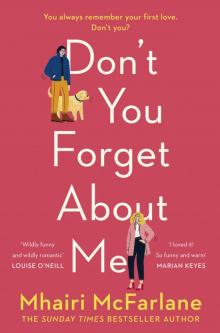 Don't You Forget About Me
Don't You Forget About Me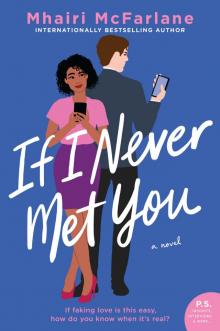 If I Never Met You
If I Never Met You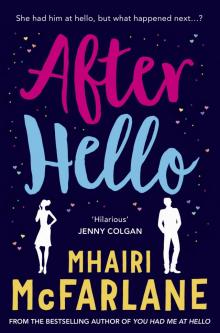 After Hello
After Hello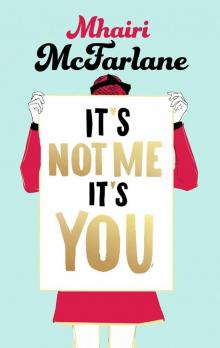 It's Not Me, It's You
It's Not Me, It's You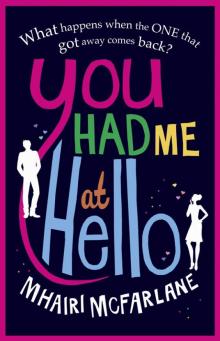 You Had Me at Hello
You Had Me at Hello Who's That Girl?
Who's That Girl?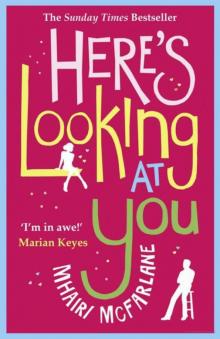 Here's Looking at You
Here's Looking at You